Regional Meeting in Dakar, Senegal

January 20 - 24, 2020, Dakar, Senegal
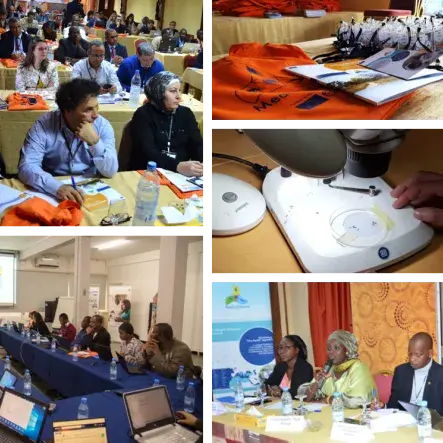
The Kick-Off Meeting which was held on last July in Paris successfully initiated the integration of the new members from Sahel within the network. To continue on this path the first Regional Meeting of the second phase of the MediLabSecure project was held in Dakar (Senegal) on January 20-24, 2020 to promote the project and its outcomes in this new targeted region.
Objectives & Content
Co-organized with the Institut Pasteur in Dakar and bringing together more than 70 participants including 40 representatives from all sectors (human and animal virology, medical entomology, public health and veterinary services, modelling and early warning tool) in 8 countries (Algeria, Burkina Faso, Mali, Mauritania, Morocco, Niger, Senegal and Tunisia), this 4-day meeting was a great opportunity to consolidate this collaborative multidisciplinary network of laboratories and public health institutions to further enhance capacity building and strengthen preparedness to vector-borne diseases in West Africa.
In line with the suggestions raised by network members in the region, the meeting was mainly focused on Rift Valley Fever with the usual “One Health” spirit that constitutes the roots of the MediLabSecure project.
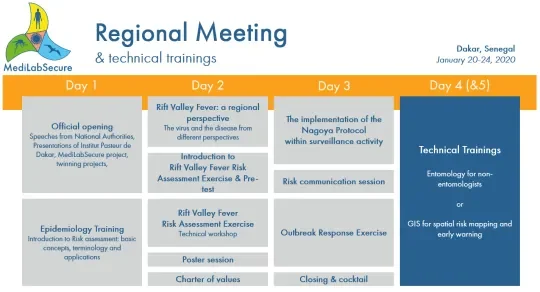
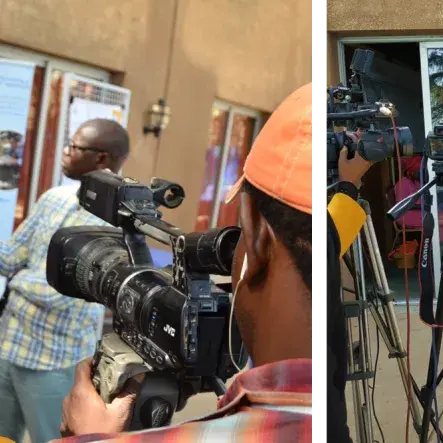
This first regional meeting was introduced with an official opening from the representatives from the Ministry of Health, Ministry of Livestock and Animal Production and the Ministry of the Environment. We were also honored to welcome the coordinator of the Senegalese One Health Task Force who provided a better understanding of the functioning of this institution and its importance in the prevention of vector-borne disease at national level.
Several Senegalese journalists from different local media were present to cover this ceremony and disseminate the meeting and project outcomes within the country.
Following this opening ceremony, the agenda of these 5 days has been designed to address clinical, entomological, epidemiological, diagnostic as well as human and animal health aspects of this regional emerging zoonosis through plenary sessions, group exercises and specific trainings.
Presentations
Presentations given during this meeting are available to download down below
Day 1
- Eddie MAIER, DG-DEVCO, European Union: "Foreword"
- Amadou SALL, Institut Pasteur de Dakar, Senegal: "Presentation of Institut Pasteur de Dakar & its emergency field response equipment"
- Maud SEGUY, Institut Pasteur, France: "Presentation of the MediLabSecure project"
- Isabelle DAOUST-MALEVAL, DG-DEVCO, European Union: "Presentation of the EU CBRN CoE Initiative"
- Traoré TIEBLE, World Health Organization, Senegal: "Strengthening public health laboratories in the WHO African Region: a critical need for disease control"
- Concha MARTIN DE PANDO, National Center for Epidemiology, Spain: "MediPIET today"
- Paolo CALISTRI, Istituto Zooprofilattico Sperimentale dell'Abruzzo e del Molise (IZSAM), Italy: "Training need assessment questionnaire"
- Paolo CALISTRI, Istituto Zooprofilattico Sperimentale dell'Abruzzo e del Molise (IZSAM), Italy: "Introduction to risk assessment"
- Paolo CALISTRI, Istituto Zooprofilattico Sperimentale dell'Abruzzo e del Molise (IZSAM), Italy: "Rapid risk assessment"
Day 2
- Jean-Claude MANUGUERRA, Institut Pasteur, France: "Fièvre de la vallée du Rift en Afrique"
- Diawo DIALLO, Institut Pasteur de Dakar, Senegal: "Rift Valley Fever vectors: the Sahelian scenario"
- Adamou LAGARÉ, Centre de Recherche Médicale et Sanitaire (CERMES), Niger: "Rift Valley Fever outbreak in Niger : a real One Health challenge"
- Cheikh TALLA, Institut Pasteur de Dakar, Senegal: "Spatial Modelling of Rift Valley Fiver vectors in Senegal"
- Yahya BARRY, Office National de Recherches et de Développement de l'Elevage (ONARDEL), Mauritania: "Fièvre de la vallée du Rift en Mauritanie: épidémies, surveillance et perspectives"
- Maria Grazia DENTE, Silvia DECLICH & Laura AMATO, Istituto Superiore dI Sanità, Italy: "Introduction to Rift Valley Fever Multisectoral Risk Assessment Exercise"
Day 3
- Cindy DIAS VILELA, Institut Pasteur, France: "The implementation of the Nagoya Protocol within surveillance activity"
- Birahim THIAM, Service National de l’Education et de l’Information pour la Santé (SNEIPS), Senegal: "Communication de crise"
Click here to download all presentations
Browse the photo album by clicking on the picture above or click here to access it directly on Flickr
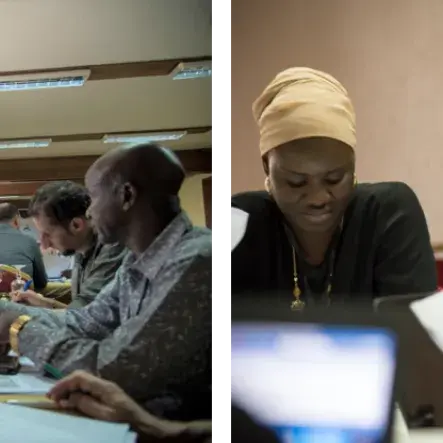
Multisectoral Risk Assessment Exercise
A Multisectoral Risk Assessment (MRA) exercise was carried out with representatives of animal health, human health and public health institutions as well as medical entomologists involved.
This exercise was conceived to foster small group discussion on the status of Rift Valley Fever (RVF) surveillance in the region and to assess level of risk at country level with the support of the methodology applied by FAO for the Risk Assessment for RVF in Niger (March 2017).
For this new edition, a ToT approach was adopted aiming at consolidating capacities and support sustainability. Indeed, MediLabSecure Focal Points who have already taken part in the previous MRA Exercise on RVF in Tunis (July 2017) have been involved in the development and execution of the Exercise in Dakar.
POSTER SESSION
A "Speed-up the network" session was organized during the Regional Meeting, aiming at enhancing networking and intersectoral exchanges among the participants. This session had the format of a poster session.
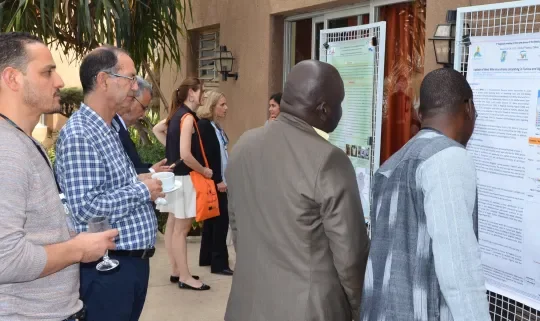
The main subject of the session was centered around surveillance, diagnostic and control of arboviruses and their vectors, ideally with a One Health approach. Eight posters were selected and presented:
- What about local integrated vector management program and mosquito surveillance/control in Tunisia? Bouattour Ali, Khrouf Fatma, Ben Ayed Wiem, Rhim Adel, M’ghirbi Youmna Laboratory of Medical Entomology, Institute Pasteur of Tunis, University of Tunis El Manar, Tunis, TUNISIA
- Update of West Nile virus strains circulating in Tunisia and Algeria: One Health perspective. Fares Wasfi (1), M’ghirbi Youmna (3), Hachid Aissam (2), Gdoura Mariam (1), Touzi Henda (1), Benbetka Chahrazed (2), Fayez Khardine (2), Benallal Kamel (4), Benbetka Sihem (4), Harrat Zoubir (4), Bouattour Ali (3), Triki Henda (1). 1: Laboratory of Clinical Virology, Institut Pasteur of Tunis, University of Tunis El Manar, Tunis, TUNISIA 2: Laboratory of Arbovirus, Institut Pasteur of Algeria, Algiers, ALGERIA 3: Laboratory of Medical Entomology, Institute Pasteur of Tunis, University of Tunis El Manar, Tunis, TUNISIA 4: Laboratory of Medical Entomology, Institute Pasteur of Algeria, Algiers, ALGERIA.
- Participation of the population in reporting the presence, and collecting data of Aedes albopictus for monitoring its geographical extension in Algeria. Garni Rafik (1), Benbetka Sihem (1), Aouissi Meriem (2), Belmadani Mouni (2), Harrat Zoubir (1) 1: Laboratoire d’Eco-épidémiologie parasitaire et génétique des populations, Institut Pasteur d’Algérie, Alger, Algérie 2: Biologie department, Université des sciences et de la technologie Houari Boumedienne, Algiers, Algeria
- Risk factors of Rift Valley Fever, Tchintabaraden, Niger, August-October 2016 Issifou Djibo (1), Marianne Laurent (1), Oumarou Batoure (1), Bernard Sawadogo (1), Simon Antara (1), Andre Mc Kenzie (2), Mamadou Sawadogo (3) 1: West Africa Field Epidemiology Training Program, Ouagadougou 2: Centers for Disease Control and Prevention, Atlanta 3: Université, Ouaga I, Pr Joseph Ki Zerbo, Burkina Faso
- Does Rift Valley fever virus and Crimean-Congo hemorrhagic fever virus circulate in Tunisia? Zouaghi Khaoula (1), Rhim Adel (1), Michel Janine (2), Nitsche Andreas (2), Surtees Rebecca (2), Bouattour Ali (1), M’ghirbi Youmna (1) 1 : Laboratory of medical entomology, Institute Pasteur of Tunis, University of Tunis El Manar, Tunis, TUNISIA 2: ZBS1 – Center for Biological Threats and Special Pathogens, Robert Koch Institute, Berlin, GERMANY
- Crimean Congo hemorrhagic virus in Northeastern Senegal: case report Aliou, Barry (1); Boly, Diop (2); Alfred Diouf (3) 1: Epidemiology and Data sciences, Institut Pasteur of Dakar, Dakar, Senegal 2: Direction of Prevention, MoH, Dakar, Senegal 3: Service Régional Elevage Matam
Identification of the circulation of the first cases of circulation of plague of small ruminants (PPR) and Rift Valley Fever (RVF) virus in Kouré giraffes in Niger Abdou Alassane (1), Issa Ibrahim Abdoulkarim (2), Haladou Gagara (1) 1: Laboratoire Central de l’élevage de Niamey BP 485, Niamey Niger 2: Université Boubacar BA de Tillabéri, BP 175, Tillabéri, Niger
- Genome characterization of Bluetongue virus strains circulating in Tunisia in the last 5 years Soufien, Sghaier(1); Alessio, Lurosso (2); Noura, Abidi (3); Ahmed, Amara (4); Mahjoub, Mejdi (4); Aymen, Heni (5); Zahra, Ben Said (6); Stefano, Cappai (7); Salah Hammami (8); Giovanni, Savini (2) 1: Laboratory of virology, Institut de la recherche vétérinaire de Tunisie, Tunis, Tunisia 2: OIE Reference Laboratory for Bluetongue, Istituto Zooprofilattico Sperimentale dell’Abruzzo e del Molise (IZSAM), Teramo, Italy
3: CRDA-Commissariat Régional de Développement Agricole, Kasserine, Tunisia 4: CRDA-Commissariats Régional de Développement Agricole, Gafsa, Tunisia 5: CRDA-Commissariats Régional de Développement Agricole, Sidi Bouzid, Tunisia 6: CRDA-Commissariats Régional de Développement Agricole, Nabeul, Tunisia 7: Istituto Zooprofilattico Sperimentale della Sardegna, Cagliari, Italy 8: École Nationale de Médecine Vétérinaire de Sidi Thabet, IRESA, Université la Manouba, Tunisie
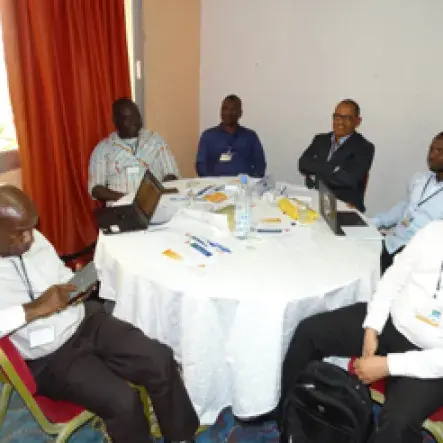
Outbreak Response Exercise
The 2nd day afternoon was dedicated to the outbreak response exercise. During this short tabletop exercise simulating an outbreak of an unknown viral disease in the region, the participants were divided into groups representing the different fields of expertise (biologists, entomologists, veterinarians, epidemiologists) and had to respond to this emergency in a ludic manner.
This educational tabletop exercise was the opportunity to raise awareness on the importance of the Intersectoral One Health Approach and sensitize the participants to the chain of information transmitted during outbreaks management through a role-playing game format.
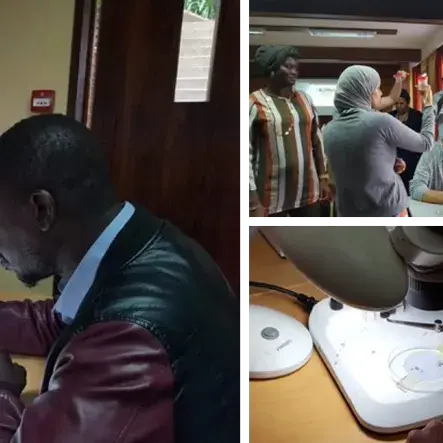
Keynote and round table: Middle East One Health Approach in early warning & preparedness for zoonoses
A training on entomology for non-entomologists was carried out on the fourth day of the Regional Meeting.
Alternating between small courses and practical exercises, this interactive one-day training on basic medical and veterinary entomology was addressed to all MediLabSecure people who are not specialist in entomology.
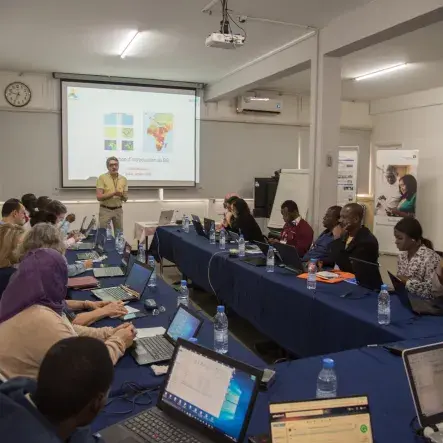
In parallel of the medical entomology training, the modelling/early warnins system working group (WP5) organized a one-and-a-half day training on GIS for spatial risk mapping and early warning. Designed and presented by Guy Hendrickx and Cedric Marsboom fromAVIA-GIS with the external support of Rafik Garni (Institut Pasteur d’Alger), this training was an introduction to an eight week distance learning course on GIS applied to epidemiology. It was also the beginning of a continuous GIS support to ensure that MediLabsecure representatives can use GIS in their professional activities related to disease surveillance and early warning. The main objectives of the GIS training are:
- To gain expertise in the use of Q-GIS to create spatial risk maps
- To establish a GIS group within MediLabSecure
- To ensure that each MediLabSecure participating country has GIS capacity to support decision support for spatial disease risk assessment in a one-health context
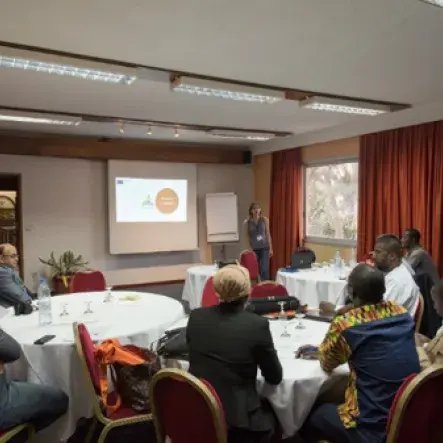
Charter of Values Collaboratives Design
All network members were invited to actively participate in the design of the MediLabSecure charter of values. The idea was to encourage and foster the network ownership and sustainability by collaboratively brainstorming on the values, aspirations and commitments that unite the network.
This workshop was tailored as a brainstorming session inspired from the MetaPlan methodology.
Participants were divided into 3 mixed groups (the groups were designed to mingle countries and working groups in order to favor collaboration and ensure representatives results). The same two questions were asked to the three groups, one question after the other, and they had to write their ideas on post-it notes, using one per idea. Altogether with the coordination team, post-its were read out loudly and organized according to their similarities into categories.
After the session, the coordination team worked to bring the results from the three groups together. A restitution of the results was made the next morning to the participants and noticeboards were created to summarize the different points The boards were displayed outside the meeting room and the participants were asked to "vote" for the nine items they considered most relevant They were given nine stickers they had to stick on the boards.
This exercise will be done with participants from each country of the MediLabSecure network. The first session will set the basis for the other Regional Meetings and the next brainstorming sessions will take into account the preliminary results of this one.